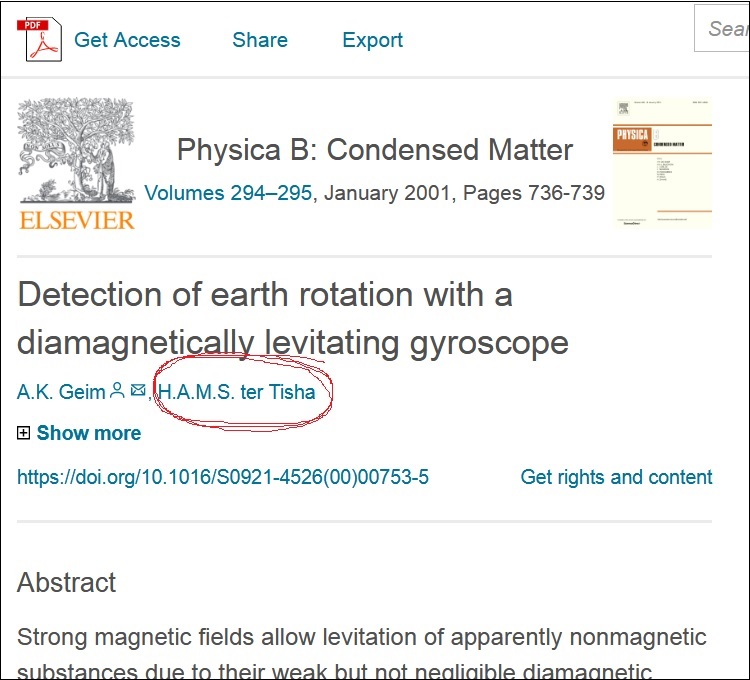Andrei Geim: Fear the technological crisis
- Transfer
“Social networks will not save us from an asteroid rushing to Earth”
- Andrei Geim (professor at the University of Manchester, in 2010 received the Nobel Prize in Physics for his work on graphene)

“What are you doing here at all?” - the billionaire who got rich on software was extremely surprised when I told him that I was a physicist. The reaction was substantial: as if he met a seasonal worker at our meeting place - the World Economic Forum in Davos.
In addition to establishing useful contacts, self-promotion and all other things (including skiing), which politicians and financiers usually do, the distinguished representatives of the countries discussed the unimportant position of the global economy in Davos last month. Heads of state believe that improved governance should help, employees of central banks see salvation in improving financial control, and investment bankers in markets. Economists offer new theories, and Internet entrepreneurs trust social networks. The only thing that agreed on is the belief that a quick solution is available and close.
The advantage of ivory towers is that they allow you to see not only actual problems. Where one sees a banking crisis, a debt crisis, and a currency crisis, scientists can see more disturbing events. We are in the midst of a technological crisis. In our time, breakthrough technologies appear much less frequently than what is required by stable economic growth. Even bankers complain about the lack of new technologies for investment.

An article on diamagnetic levitation , in which Heim's co-author listed his favorite hamster Tisha. Subsequently, this work was used in obtaining the degree of Ph.D.
Just look at the second half of the last century - it was packed with technological advances. The silicon revolution led to the advent of computers, microchips, mobile phones and the Internet. There was also Satellite, lasers, Space Race and global navigation satellite system GPS. And in the past two decades, in addition to social networks, it is not so much about breakthrough technologies, but rather about improving the same gadgets.
Many economists argue that the "low-hanging fruits" were collected, and now we are approaching a protracted period of stagnation. But since there is no obvious economic recession, people almost do not pay attention to it. Economists are well known for their eloquent explanations of what was wrong with past theories, but this does not help.
“Of flying frogs and levitrons” is an article that earned Schnebel's physics in 2000 .

[ Source ]
My own ivory tower gives an idea of basic science, in which economists take no risks. I see big problems in the transfer of new knowledge. The point is not that there are no new discoveries, but that the speed has become less. Without new knowledge, only derived technologies are possible and, no matter how important they are, they are unable to maintain such growth rates that the whole world has enjoyed since the beginning of the industrial revolution.
For a layman, exploring the blue sky may seem like a waste of money, because it does not carry “bread and circuses.” However, if you look at things from the other side, you can understand that there is no useless fundamental knowledge. The silicon revolution would not have been possible without quantum physics. Protecting information online and computers do not break every second thanks to abstract math. Einstein's theory of relativity may not seem so significant, but without it the satellite navigation system will not work. The path from basic discoveries to goods for consumption is long, incomprehensible and slow, but there will be no foundation without basics.
It would seem logical to invest in space exploration in order to obtain new knowledge. And everyone with whom I spoke in Davos, clearly advocated an increase in support for science. Unfortunately, people are illogical. When I asked the same people whether their companies would pay a science-oriented tax, the answer was equally straightforward - no. Like personal income tax. As if money could come from somewhere else.
40 years ago, the threat of war forced countries to seek out long-term advantages over their enemies. Let me just say that this resulted in an investment in science and allowed the industrial revolution to continue. Nowadays, the threat of global warming, overpopulation and the scarcity of natural resources does not seem to be enough frightening.
Western governments are rolling out their space exploration programs in response to financial constraints and negative voter attitudes toward scientific research. Davos convinces me that there is almost no hope for change. It is necessary to change human nature. I am afraid that this time economists are right, and Japanese-style stagnation is our best bet.
But I have a dream. The industrial revolution and economic growth will continue. That's because astrophysicists have found a huge asteroid, which will approach our planet in 50 years. This is quite scary. The world, of course, will be able to reflect this threat, but only with the development of new knowledge and technology. Finally, in my dreams, humanity is aware that social networks can really make some very rich, but they will not save the planet. This requires fundamental discoveries.
More materials:
- Autobiography (eng)
- Elements: "Nobel Prize in Physics - 2010"
- Speech by Andrei Heim, Nobel Prize winner in physics
- Trinity option: "I am a citizen of Europe"
- Game to help
- Nobel lecture: Random walk: unpredictable path to graphene
- Andrei Geim about the Nobel Prize
- "On the fig I need Russia?"
About Shnobelevka:
Only registered users can participate in the survey. Sign in , please.
